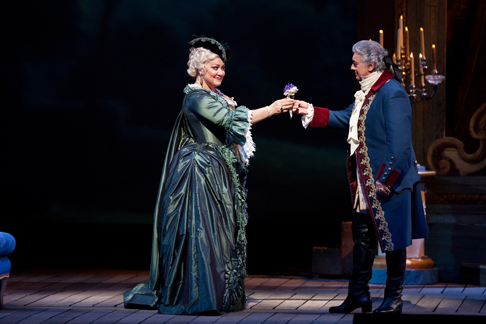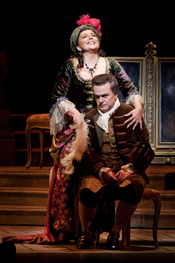![Plácido Domingo as Maurizio and Maria Guleghina as Adriana Lecouvreur [Photo by Marty Sohl courtesy of The Metropolitan Opera]](http://www.operatoday.com/Adriana_Met_01.png)
25 Feb 2009
Adriana Lecouvreur at the MET
There come nights in the opera season where gesamtkunstwerke won’t do — enough of epic masterpieces and supreme lyric outpourings of the human spirit!
English Touring Opera are delighted to announce a season of lyric monodramas to tour nationally from October to December. The season features music for solo singer and piano by Argento, Britten, Tippett and Shostakovich with a bold and inventive approach to making opera during social distancing.
This tenth of ten Live from London concerts was in fact a recorded live performance from California. It was no less enjoyable for that, and it was also uplifting to learn that this wasn’t in fact the ‘last’ LfL event that we will be able to enjoy, courtesy of VOCES8 and their fellow vocal ensembles (more below …).
Ever since Wigmore Hall announced their superb series of autumn concerts, all streamed live and available free of charge, I’d been looking forward to this song recital by Ian Bostridge and Imogen Cooper.
The Sixteen continues its exploration of Henry Purcell’s Welcome Songs for Charles II. As with Robert King’s pioneering Purcell series begun over thirty years ago for Hyperion, Harry Christophers is recording two Welcome Songs per disc.
Although Stile Antico’s programme article for their Live from London recital introduced their selection from the many treasures of the English Renaissance in the context of the theological debates and upheavals of the Tudor and Elizabethan years, their performance was more evocative of private chamber music than of public liturgy.
In February this year, Albanian soprano Ermonela Jaho made a highly lauded debut recital at Wigmore Hall - a concert which both celebrated Opera Rara’s 50th anniversary and honoured the career of the Italian soprano Rosina Storchio (1872-1945), the star of verismo who created the title roles in Leoncavallo’s La bohème and Zazà, Mascagni’s Lodoletta and Puccini’s Madama Butterfly.
Evidently, face masks don’t stifle appreciative “Bravo!”s. And, reducing audience numbers doesn’t lower the volume of such acclamations. For, the audience at Wigmore Hall gave soprano Elizabeth Llewellyn and pianist Simon Lepper a greatly deserved warm reception and hearty response following this lunchtime recital of late-Romantic song.
Collapsology. Or, perhaps we should use the French word ‘Collapsologie’ because this is a transdisciplinary idea pretty much advocated by a series of French theorists - and apparently, mostly French theorists. It in essence focuses on the imminent collapse of modern society and all its layers - a series of escalating crises on a global scale: environmental, economic, geopolitical, governmental; the list is extensive.
For this week’s Live from London vocal recital we moved from the home of VOCES8, St Anne and St Agnes in the City of London, to Kings Place, where The Sixteen - who have been associate artists at the venue for some time - presented a programme of music and words bound together by the theme of ‘reflection’.
'Such is your divine Disposation that both you excellently understand, and royally entertaine the Exercise of Musicke.’
Amongst an avalanche of new Mahler recordings appearing at the moment (Das Lied von der Erde seems to be the most favoured, with three) this 1991 Mahler Second from the 2nd Kassel MahlerFest is one of the more interesting releases.
‘And there was war in heaven: Michael and his angels fought against the dragon; and the dragon fought and his angels, And prevailed not; neither was their place found any more in heaven … that old serpent … Satan, which deceiveth the whole world: he was cast out into the earth, and his angels were cast out with him.’
If there is one myth, it seems believed by some people today, that probably needs shattering it is that post-war recordings or performances of Wagner operas were always of exceptional quality. This 1949 Hamburg Tristan und Isolde is one of those recordings - though quite who is to blame for its many problems takes quite some unearthing.
There was never any doubt that the fifth of the twelve Met Stars Live in Concert broadcasts was going to be a palpably intense and vivid event, as well as a musically stunning and theatrically enervating experience.
‘Love’ was the theme for this Live from London performance by Apollo5. Given the complexity and diversity of that human emotion, and Apollo5’s reputation for versatility and diverse repertoire, ranging from Renaissance choral music to jazz, from contemporary classical works to popular song, it was no surprise that their programme spanned 500 years and several musical styles.
The Academy of St Martin in the Fields have titled their autumn series of eight concerts - which are taking place at 5pm and 7.30pm on two Saturdays each month at their home venue in Trafalgar Square, and being filmed for streaming the following Thursday - ‘re:connect’.
The London Symphony Orchestra opened their Autumn 2020 season with a homage to Oliver Knussen, who died at the age of 66 in July 2018. The programme traced a national musical lineage through the twentieth century, from Britten to Knussen, on to Mark-Anthony Turnage, and entwining the LSO and Rattle too.
With the Live from London digital vocal festival entering the second half of the series, the festival’s host, VOCES8, returned to their home at St Annes and St Agnes in the City of London to present a sequence of ‘Choral Dances’ - vocal music inspired by dance, embracing diverse genres from the Renaissance madrigal to swing jazz.
Just a few unison string wriggles from the opening of Mozart’s overture to Le nozze di Figaro are enough to make any opera-lover perch on the edge of their seat, in excited anticipation of the drama in music to come, so there could be no other curtain-raiser for this Gala Concert at the Royal Opera House, the latest instalment from ‘their House’ to ‘our houses’.
"Before the ending of the day, creator of all things, we pray that, with your accustomed mercy, you may watch over us."
![Plácido Domingo as Maurizio and Maria Guleghina as Adriana Lecouvreur [Photo by Marty Sohl courtesy of The Metropolitan Opera]](http://www.operatoday.com/Adriana_Met_01.png)
There come nights in the opera season where gesamtkunstwerke won’t do — enough of epic masterpieces and supreme lyric outpourings of the human spirit!
There are nights at the opera when we want to have fun. Francesco Cilea wrote Adriana Lecouvreur for such occasions, and such occasions there are in glorious plenty in the current Met revival of this sublime bit of kitsch. If that other grand operatic folderol La Gioconda, revived in the Met’s opening week last fall, had been cast with half the care or staged with half the expertise of this Adriana, it would have been a hit and not a yawn. For one thing, the title role in Gioconda should certainly be offered to Maria Guleghina, who performs Adriana with all the excitement (if not exactly the dependable legato) that both roles call for. She would give Gioconda the fire it conspicuously lacked last fall — the fire that makes a Gioconda — or an Adriana. Guleghina knows what melodrama is all about. When her Adriana, feverishly dying, cried, “Melpomene son io!” one did not quite believe it, but one did believe that Guleghina, as Adriana, believed it.
Guleghina does not have a reliable instrument. I’m trying to choose my words carefully here. Her voice is extraordinary — sometimes it bubbles over like some great Russian river in flood, whelming the landscape in solid sound, and at other times it blinks out just when you hoped you could rely on it. Her technique is not smooth when a quieter voice is called for, the exquisite thread of a Milanov or a Freni is not hers to command. She sings the great aria of her first appearance, “Io son l’umile ancella,” in separate bursts, divided voices, not as if she is explicating her theatrical technique (the text at this point) but as if there is a disjunction between the amount of breath she has summoned and the amount that arrives. This can unsettle, as it does in such other Guleghina signature roles as Verdi’s Abigaille and Lady Macbeth — but they both require a coloratura precision she does not have; Adriana does not, and is therefore a better role choice for her. She tosses herself about with abandon in the love scenes, but she is at the top of her form in the great confrontations with Olga Borodina’s Princesse de Bouillon, and when, at the climax of Act II, these two great ladies in full cry and spectacular silken costumes, panniers on display like the plumage of prehistoric birds in battle array, it is one of opera’s great scenes presented at the pitch of gladiatorial combat. Poisoned violets? I was surprised not to see blood and broken bones, picked clean by harpie teeth and claws.
 Olga Borodina as The Princess de Bouillon and Plácido Domingo as Maurizio
Olga Borodina as The Princess de Bouillon and Plácido Domingo as Maurizio
Borodina, of course, is one of the great voices of our time and one of New York’s happiest acquisitions from the Russian vocal stable. Her Laura was a rare fine feature of the Gioconda, but the Princesse is a far more violent, desperate character — which suits her admirably. We hate the Princesse because she refuses to give up the man she loves, though he loves Adriana, and because she resorts to poison to keep him — but remember, she’s in the throes of first passion, after years of an arranged, aristocratic marriage, and Cilea spares her a dab of sympathetic treatment. In any case, Borodina’s singing is always passionate without losing track of musicianship. Her low tones are utterly Russian, but she has learned how to deploy them in Italian music (and French music) without Slavic accents, and her control in this hectic part was icily correct. When she wants a note to go here, it goes here, if there, it goes there, nowhere else, precisely pitched and just as loud or as soft as she desires it to be. This is not as common (especially among the ladies in the Italian repertory nowadays) as it might be, and I wish she’d give Guleghina a coaching session or two.
 Roberto Fontali as Michonnet and Maria Guleghina as Adriana Lecouvreur
Roberto Fontali as Michonnet and Maria Guleghina as Adriana Lecouvreur
The original choice for Maurizio being transferred to the new
Trovatore, the role was given to Plácido Domingo, originally set to
conduct these performances. Maurizio was the role of his Met debut forty
years ago, and everyone (not least Guleghina) was thrilled that he got
through it decently — but let’s be frank, shall we? This was not a
performance to thrill from any singer less beloved. Though his manner was
able and gallant, his sound was dry and strangulated, his great martial aria
of Act III rather painful than otherwise. When he sang Gherman in The
Queen of Spades in 2004, he still sounded youthful as well as romantic;
in this far lighter role he was no longer a pleasure to hear. Only by the
final romantic duet with the dying Adriana had he warmed to some beautiful
phrases; his sobs were heart-melting and will be, for me, perhaps, a
satisfying last vocal effort from the tenor of the Traviata that
first made me an opera fan forty-three years ago.
Roberto Frontali made a touching, satisfying Michonnet, and John Del Carlo charmingly (and loudly) occupied the role of the scheming Prince de Bouillon. Marco Armiliato kept a good pace in the pit, allowing the fragrant melodies of this fragile work to bloom sweetly under his care, and supporting the singers nimbly.
John Yohalem